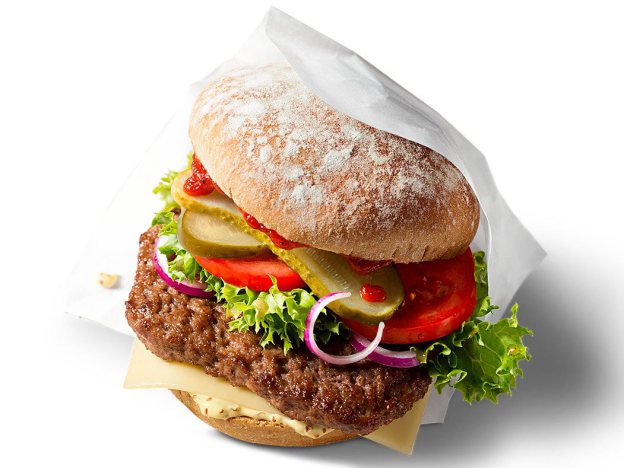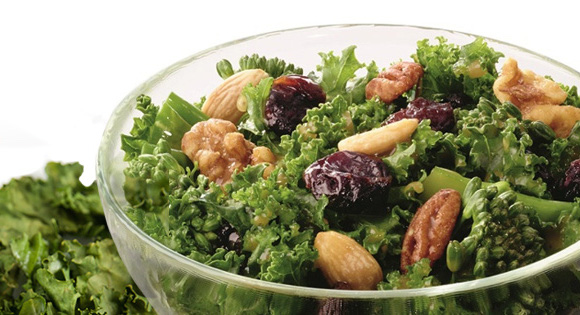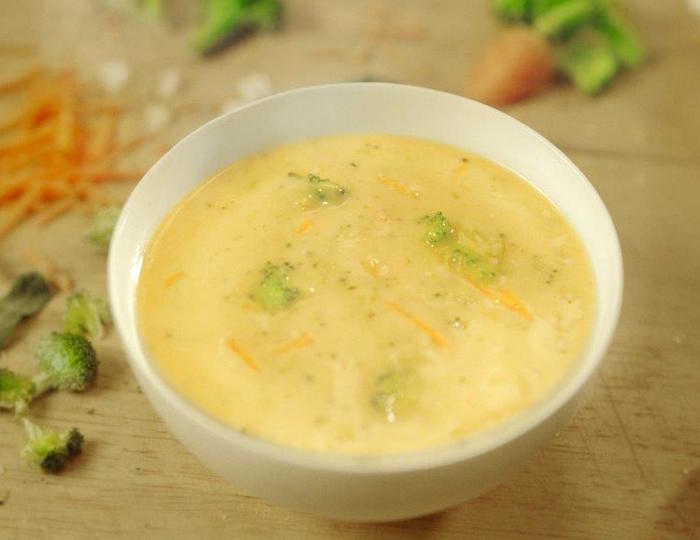Would You Like Kale With That? Big Healthy Changes Are Coming to the Fast Food Industry
 Several years ago, I drove with friends across a barren desert out West. After several hours of no civilization and not a snack in the car, we stopped to enjoy our only dinner option: Burger King.
Several years ago, I drove with friends across a barren desert out West. After several hours of no civilization and not a snack in the car, we stopped to enjoy our only dinner option: Burger King.
As a New York City health journalist-slash-food snob (and at the time, a vegetarian, to boot), I hadn’t eaten fast food in years, and I studied the menu until I saw, in the bottom corner, in fine print, a veggie burger (essentially my only option). When I asked for it, the cashier looked at me like I had three heads and then turned herself around to check if it was really listed on the menu board.
Today, she may have smiled and asked, “Would you like kale with that?”
Okay, not quite, but a new era of healthier fast food may be on the horizon, and Chick-fil-A's shocking replacement of its coleslaw with kale salad this month is just one example.
In 2014, Carl's Jr. introduced an "all-natural" burger made with beef from grass-fed cows. Last year, McDonald’s announced it would be switching to chicken that is largely antibiotic-free, started test-driving an all-organic burger in Germany, and debuted a cafe concept in Canada that serves quinoa salads and a lentil-sweet potato hummus-kale wrap. Subway and Papa John’s announced they're eliminating artificial ingredients from their food, while Panera took that a step further, releasing a "No No List" of 150 unhealthy ingredients—including artificial flavors, preservatives, and sweeteners—that it would be phasing out by the end of 2016.

{{post.sponsorText}}
"In the 12 years since Super Size Me came out, the industry has changed a lot, and peoples’ attention to what they’re eating and the importance of health and wellness has really increased,” observes health coach and chef Alex Jamieson, who co-created and co-starred in the groundbreaking documentary, back then, to call attention to fast food's damaging effects on the body.
"The word is out that highly processed foods are not a good basis for healthy diets," adds food politics expert and author Marion Nestle, the Paulette Goddard Professor in the Department of Nutrition, Food Studies, and Public Health at NYU. "The trend is clear: fresh, natural, local, organic. This is hard for fast food and processed food makers to accomplish, but they are all trying."

Why fast food companies now have to care about healthy options
Take Panera, for example, which officially rolled out its reformulated soups this month, including top-sellers like the broccoli cheddar, which was revised around 60 times before the company was satisfied that customers would not miss the deliciously artificial flavors. "It’s been incredibly challenging, because it’s not as simple as just taking something out and inserting something in its place. In many cases it’s much more complicated than that," explains Sara Burnett, Panera's director of wellness and food policy."We purchase a little over 450 ingredients at a given time, and about 150 had to be reformulated."
But Burnett says it's more than worth it for the company, which has been working to meet their customers' demands for healthier, more transparent food options for more than 10 years, from eliminating trans fats to making calorie counts available. "There was this growing sentiment from our guests saying we want this information front and center," she says. "We kept coming back to, 'What information do our guests really want to know about their food? What’s really important to our guests?"
Increasingly, that's been "real food" ingredient lists, and Nestle says she sees controversial Food Babe blogger Vani Hari as having an surprisingly strong influence on that shift. "Regardless of its rationale, her campaign has been remarkably effective in galvanizing public support for removal of unnecessary food additives," Nestle says.
Then, of course, there's the fact that a new breed of "fast casual" companies like Sweetgreen and Jose Andres' Beefsteak are making huge waves, expanding at a rapid clip across the country.
Execs at companies like McDonald's are no doubt watching that success as their own sales slump. "We already know that the word 'natural' on a food product helps sell it, no matter what it contains. I’ve seen studies suggesting that the word 'organic' on a food product makes people think it has fewer calories," Nestle reasons. "That’s how humans react to such terms and marketers freely take advantage of that human characteristic."

The impact of a kale salad at Chick-Fil-A
But here's the thing: the experts I talked to all shared a common viewpoint: who cares if the changes are happening just because Papa John's sees potential for profit and wants to get a piece of the non-GMO, gluten-free pie?
At the end of the day, "people would be healthier eating food rather than food products," Nestle says. "If lots of people make this shift, the population will be healthier."
Jamieson agrees, and says that we shouldn't underestimate the power of Chick-Fil-A offering a kale salad. "It may change the perspective of a few people who frequent fast food restaurants," she reasons, "to thinking that healthy food is good, that it’s widely available, that it’s not weird." Not to mention the fact that many fast food restaurants are located in food deserts where fresh produce and whole foods are not even available in other forms, and that their food is actually affordable for low-income families.
Finally, the impact these shifts could have on the food system is huge. Burnett says that having a positive impact on that front has been one key element for Panera. "We certainly purchase and sell a lot of food, so that creates a lot of power and responsibility for us," she says.
"I’m a big supporter of buying local, but it can’t just be 'buy local'," Jamieson adds. "If Walmart makes one change in their store and they start offering organic chicken or apples, that has an enormous impact because of their buying power, so think about scale and how quickly we want things to change." —Lisa Elaine Held
Next up: Introducing the United Nations' healthy food of the year—and a recipe...
(Photos: McDonald's Germany, Chick-Fil-A, Panera)
Loading More Posts...